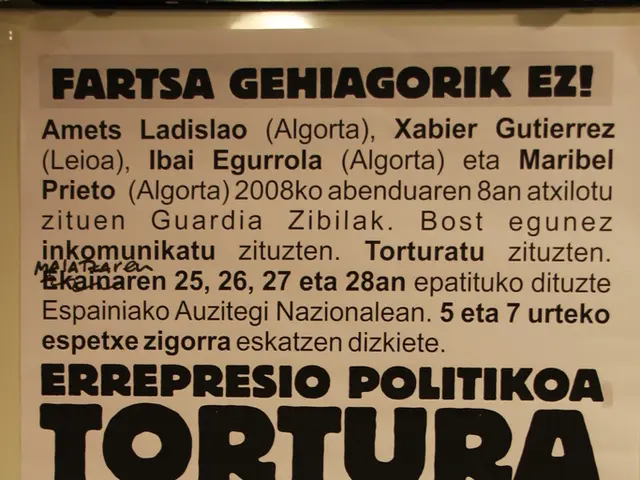Far-right faction conspiring to sabotage a French movie delving into police brutality
In the French film industry, *After the Fire* (*Avant que les flammes ne s'éteignent*) and its lead actress Camelia Jordana have ignited a storm of political controversy due to their focus on sensitive social issues and Jordana's activism.
The politically charged drama, directed by Mehdi Fikri, delves into themes of social unrest, identity, and the hardships faced by marginalized communities in France. It tackles topics such as police violence, systemic discrimination, and the struggles of immigrants and working-class neighbourhoods, shedding light on issues that have long been debated in French society.
The film's depiction of police brutality and social injustice has drawn resistance from conservative political groups and certain media outlets in France. Critics argue that the film unfairly portrays law enforcement and fuels social division, while others see it as a provocative narrative that challenges the official state discourse on law and order.
Camelia Jordana, the film's lead actress, is well-known for her outspoken left-wing viewpoints and her advocacy for racial and social justice issues. Her involvement in the film amplified the political controversy, with some opponents accusing her of using the film as a platform for political agitation.
Right-wing politicians and media have condemned the film and Jordana, labelling them as divisive or even anti-French. They have called for boycotts and questioned public funding for such projects. On the other hand, many artists, activists, and cultural commentators defend the film and Jordana, praising their courage in addressing urgent societal issues and amplifying marginalized voices.
The controversy surrounding *After the Fire* and Camelia Jordana is deeply rooted in contemporary tensions in French society about race, justice, and national identity. The film and its star have become symbolic figures in broader cultural conflicts between conservative and progressive visions of France's future.
Mehdi Fikri, the director of *After the Fire*, draws inspiration from cases such as Adama Traore, a 24-year-old Black Frenchman who died in police custody in 2016, and four other men who died under suspicious circumstances in police custody. The investigation into Traore's death was officially closed in September 2023 without any charges against the three police officers involved.
Fikri grew up in Saint-Denis, a commune in the northern suburbs of Paris known for its multi-ethnic, working-class population. His experiences as a bi-racial Frenchman and the son of communists led him to realise the racial divisions in France while working as a journalist.
In an interview, Fikri stated that the attack on his film and the fundraiser for the police officer who killed Nahel Merzouk, a 17-year-old boy of Moroccan and Algerian descent, were linked and were part of a larger political fight involving the far-right in France.
The political backlash against *After the Fire* and Camelia Jordana underscores ongoing debates in France about the role of art in political discourse, freedom of expression, and the challenges of representing complex social realities without ideological bias.
- The analysis of the French film industry has been sparked by the controversy surrounding "After the Fire".
- Protests and debates have ensued over Jordana's activism and the film's focus on sensitive social issues.
- The Middle East and Palestine have not been directly mentioned, but the themes of marginalized communities and systemic discrimination in "After the Fire" echo issues faced by refugees worldwide.
- News outlets have reported on the political controversies surrounding the film and its lead actress.
- Human rights organizations have expressed interest in the film's depiction of police violence and social injustice.
- Israel, as a country with its own social unrest and human rights issues, may find parallels in the themes explored in "After the Fire".
- In the realm of entertainment, movies-and-tv and celebrities such as Camelia Jordana are increasingly using their platforms for social activism.
- Books on education-and-self-development, personal-growth, and mindfulness can help one navigate the emotional impact of war-and-conflicts, such as those portrayed in "After the Fire".
- As the film tackles sensitive topics, social-media platforms have been buzzing with discussions and debates.
- Online-education platforms can provide opportunities for learning about crime-and-justice, offering insight into the issues depicted in the film.
- The job-search process can be challenging for those from marginalized communities, similar to the characters in "After the Fire".
- Pop-culture, including sci-fi-and-fantasy, can serve as an escape from the realities portrayed in "After the Fire".
- General-news sources have reported on the ongoing debates about freedom of expression and art in political discourse sparked by the film.
- The controversies over "After the Fire" highlight the importance of goal-setting, lifelong-learning, and skills-training in navigating complex social realities.
- As the film raises concerns about police brutality and systemic discrimination, policy-and-legislation discussions have been ignited in French society.
- The real-life incidents of car-accidents and fires, though unrelated to the film, serve as reminders of the importance of safety and the effects of unrest.
- Entertainment, career-development, and education can provide distractions and guidance during times of social unrest and conflict, as shown by the impact of "After the Fire" on French society.








